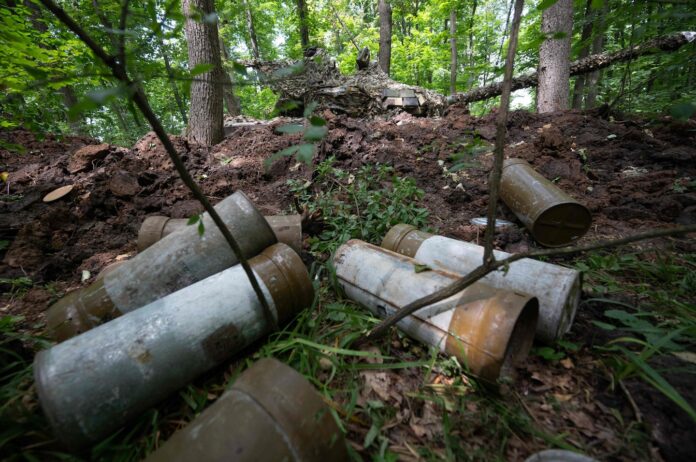KYIV, Ukraine — Ukrainian fighters have retaken approximately 40 square miles of territory from Russian occupying forces, officials here said Thursday, and Kyiv’s long-anticipated counteroffensive was advancing “gradually but surely.”
The claims could not be verified independently; the Ukrainian military has restricted journalists’ access to the front lines. But if true, the gains would represent further modest progress in the counteroffensive, which officials are hoping will force the Russians to retreat and shore up the confidence of Ukraine’s Western supporters.
Separately, the Ukrainian military said earlier this week that it had liberated seven small villages in southeastern Ukraine, most clustered near the border of the Donetsk and Zaporizhzhia regions.
Brig. Gen. Oleksiy Hromov, deputy chief of the main operations department of the Ukrainian military’s general staff, told reporters in Kyiv on Thursday that the recapture of these villages amounted to a gain of about 31 square miles.
“We are ready and we will continue to fight, until we liberate our territory, with even our bare hands,” Hromov said.
But Deputy Defense Minister Hanna Maliar cautioned that Ukrainian forces were on the defensive elsewhere along the front.
“Our troops are dealing with strong enemy resistance and their superiority in numbers of men and weapons,” Maliar wrote on Telegram. “The enemy is trying with all his might to prevent the advance of our troops.”
Maliar said fighting continued in the areas near the towns of Makarivka, Novodanilivka and Novopokrovka south of Orikhiv in the Zaporizhzhia region and toward Rozdolivka and Brekhivka on the outskirts of Bakhmut in the Donetsk region.
“At the same time, the offensive continues in several directions,” she wrote. “Our defenders are gradually but surely moving forward and inflicting significant losses on the enemy.”
Moscow, meanwhile, said Russian fighters had inflicted heavy losses on Ukraine’s military across the front line in the country’s south and east. In one attack, Defense Ministry spokesman Igor Konashenkov said Thursday, Russian missiles and aircraft struck Ukrainian mechanized brigades in Donetsk, killing “up to 340 Ukrainian troops” and destroying “two armed combat vehicles, four trucks, and a D-30 howitzer” over the previous 24 hours. The claims could not be independently confirmed.
In the latest of its overnight air assaults, Russia launched four cruise missiles and 20 self-destructing drones against Ukrainian cities. Kyiv said one missile and all drones were intercepted by air defenses, but the remaining missiles struck “industrial enterprises” in Kryvyi Rih, the hometown of Ukrainian President Volodymyr Zelensky, where an airstrike two days earlier killed 13 people.
Ukrainian officials have warned that the counteroffensive will exact a high toll in human lives and equipment — worsened, they’ve said, by the lack of Western aviation to provide air cover and long-range artillery that can reach deeper into Russian-held territory than is currently possible.
Still, they said, the beginning of the attack could not be delayed. Kyiv wants to register major battlefield gains this summer and fall, before the harsh winter sets in — and to give Western backers evidence that Ukraine is capable of defeating Russia.
Support for Ukraine going forward will be the focus of a NATO leaders’ summit next month in Vilnius, Lithuania.
U.S. officials say they recognize that Kyiv’s progress in eastern and southern Ukraine will be slow going.
“Ukraine’s fight is a marathon, and not a sprint,” U.S. Defense Secretary Lloyd Austin said in Brussels on Thursday at a meeting of ministers from about 50 countries backing Kyiv’s war efforts.
Austin said that the United States “will stand with Ukraine for the long haul,” and military equipment and training would continue to flow so that Kyiv can “prevail over [Russian President Vladimir] Putin’s campaign of cruelty and conquest.”
Norway’s Defense Ministry said Thursday that Norway and Denmark agreed to send an additional 9,000 artillery rounds to Ukraine to meet the country’s “urgent need” for additional artillery ammunition.
As fighting raged on, Rafael Mariano Grossi, director general of the International Atomic Energy Agency, the U.N. nuclear watchdog, visited the Zaporizhzhia nuclear power plant, Europe’s largest, which is under Russian control close to the fighting.
Grossi’s planned visit Wednesday was postponed due to heavy fighting. He has said he is “very concerned” that the plant could be caught in the crossfire between the sides.
Worries have grown that the destruction of the Kakhovka dam on the Dnieper River in southern Ukraine could put the nuclear station at further risk. The plant uses a cooling pond fed from a reservoir to cool its six reactors. Russia and Ukraine each blame the other for the breach in the dam, which they say was caused by an explosion.
Russian news agencies quoted Grossi saying Thursday that the situation at the plant was serious but there was enough water in the cooling pond for continued safe operation. He said it was not possible for Moscow and Kyiv to sign an agreement for the plant’s security because there was no cease-fire, the agencies reported.
Under bright sun on Thursday, few soldiers could be seen on the roads that weave through the fields and farmlands of Donetsk north of Velyka Novasilka.
On the side of a road near a wooded area in one of the recently liberated villages, a group of men changed the tires of an armored vehicle they said was damaged by Russian shelling. Occasional explosions sounded in the distance.
“We will continue on the offensive,” one of the men said. “We must push and we must win.”











